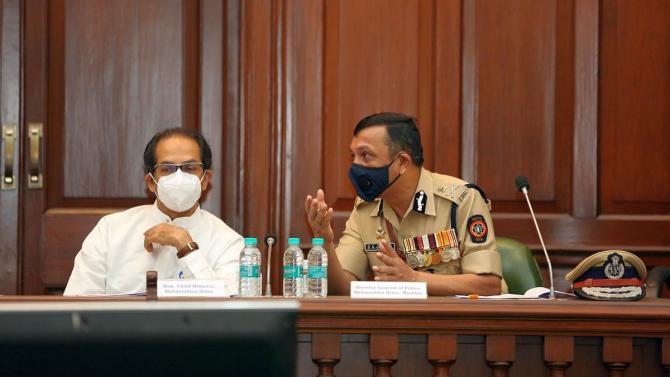 | « Back to article | Print this article |
CBI director Subodh Jaiswal himself should be considered a "potential accused" in the central agency's probe against former Maharashtra home minister Anil Deshmukh, the state government told the Bombay High Court on Thursday.

Senior counsel Darius Khambata, who appeared for the Maharashtra government, told a bench of Justices Nitin Jamdar and S V Kotwal that during 2019 to 2020, when Jaiswal was the state Director General of Police (DGP), he was also part of the Police Establishment Board.
The senior IPS officer was thus involved in decisions on transfers and postings of police officers which the CBI is now probing, the lawyer said.
The Maharashtra government has challenged before the high court summons issued by the CBI to state chief secretary Sitaram Kunte and present state DGP Sanjay Pandey to record statements in connection with the agency's probe against Anil Deshmukh.
Recommendations for transfers and postings were approved by Jaiswal in his capacity as DGP during Deshmukh's tenure, Khambata said.
"A CBI probe is ongoing into transfers and postings of state police officers made during former home minister Anil Deshmukh's tenure. Then the next in line (to be probed) is the Director General of Police, who is the fulcrum, who is at the heart of the issue of transfers and postings. So having the former DGP head the investigation is like having Anil Deshmukh investigate it himself," the state's lawyer said.
The CBI is probing allegations of corruption made by former Mumbai police commissioner Param Bir Singh against Deshmukh, an NCP leader.
Following an order of the Bombay High Court on April 5, 2021, the CBI conducted a preliminary inquiry into the allegations made by Singh against Deshmukh and later registered an FIR.
In September this year, the CBI summoned Maharashtra chief secretary Sitaram Kunte and the present DGP Sanjay Pandey for recording statements in the case.
The Maharashtra government has moved the HC challenging the summons.
Advocate Khambata also pointed out that the HC's April 5 order had said that whoever was part of the alleged corruption, even the complainant himself, must be investigated.
He showed the court the minutes of meetings where Jaiswal, as part of the police establishment board, had approved transfers of several police officers.
Jaiswal was present at every meeting on transfers, Khambata claimed.
"So shouldn't the CBI ask Jaiswal why he recommended these transfers? But to do this, a CBI officer will have to summon and question his own director.
"Even in theory, it is absurd. It is the very antithesis of a fair investigation when the CBI director is a potential accused," the state's lawyer added.
Jaiswal, who was known to be an "upright officer," must himself state that the CBI cannot go on with its probe, Khambata said.
"It will be absurd if a junior CBI officer will have to put these questions to his director. And it boggles my mind that a potential accused is heading the agency," he said.
Khambata urged the HC to appoint a retired judge or some other suitable person to head the probe against Deshmukh and monitor it.
Solicitor general Tushar Mehta and Additional Solicitor Generals Aman Lekhi and Anil Singh, who appeared for the CBI, opposed the state's plea.
"The state's stand is disingenuous. It is a misconceived petition to delay and derange the investigation," Lekhi claimed.
The court said it could not grant any interim stay to the summons as it would mean making comments on the merits of the case.
It granted liberty to the CBI to file a reply and posted the matter for further hearing on October 28.